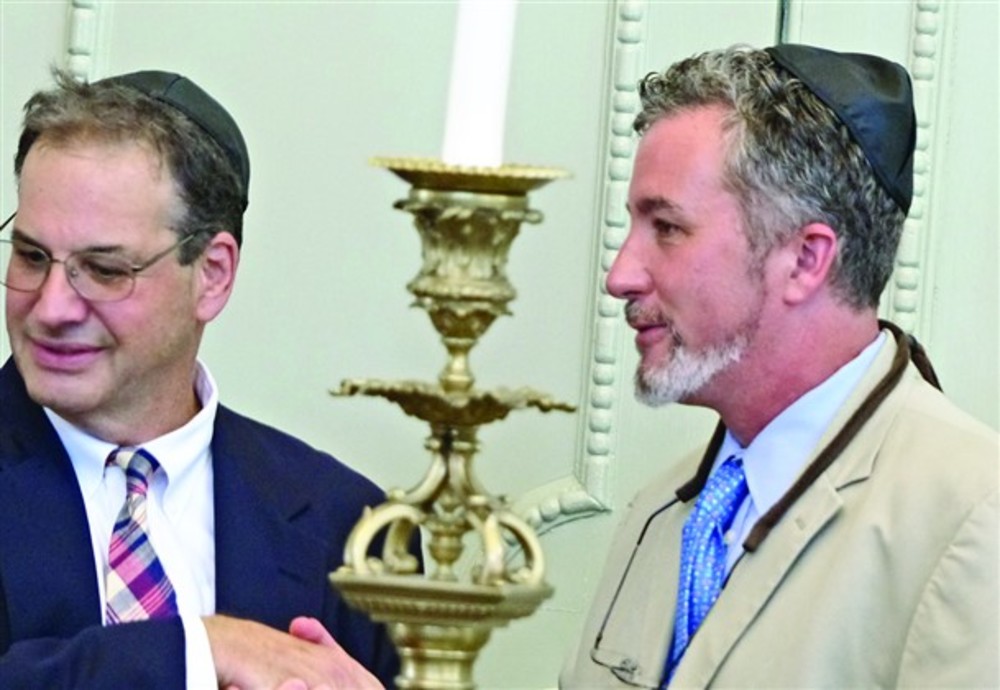President Washington returns to Touro Synagogue
 Teny Gross accepts Teitz award from Andrew Teitz (left).
Teny Gross accepts Teitz award from Andrew Teitz (left).
NEWPORT – Two hundred and twenty-five years after George Washington visited Newport, Rhode Island, he made a return visit to read his famous letter to the Hebrew Congregation. That’s right. George Washington – aka actor Matthew Mees – walked into the synagogue and read his letter in dramatic style.
Prior to the president’s reading, Touro Synagogue Warden Moses Seixas – aka actor Seàn O’Brien – read his letter.
The occasion was the 68th annual reading of the George Washington letter affirming religious tolerance. This year, the reading of the two letters – the first by Seixas and the second penned by President Washington on Aug. 17, 1790 – was by professional actors in full period costume.
Prior to the readings, the Alexander George Teitz Award was conferred. The award, established in 1993, is to honor an individual who gives the Washington letter and its words “to bigotry no sanction, to persecution no assistance” a present-day context, embodying the ideals of Washington on religious, ethnic and racial tolerance.
Teny Oded Gross, this year’s recipient, was selected for his work in ending senseless violence and intolerance in Providence. As executive director of the Institute for the Study and Practice of Nonviolence, in Providence, he seeks to end violence with nonviolence. His approach is to build relationships with those involved in violence.
In his acceptance remarks, Gross exhorted all to combat violence at every level. He said democracy cannot be taken for granted and “violence can lead to Auschwitz.”
This year’s keynote speaker was Curtis G. Viebranz, president and chief executive officer of George Washington’s Mount Vernon estate.
In his address, Viebranz put the Washington letter into historical context by noting that Washington’s visit to Newport in 1790 was to acknowledge Rhode Island as the last of the 13 original states to ratify the U.S. Constitution, in May of that year. Washington traveled from New York with his secretary of state, Thomas Jefferson.
During these presidential visits, it was the custom for clergy of many denominations to send or read messages of welcome and approbation honoring George Washington as the first U.S. president. In the spirit of acknowledging the new country and expressing concern for the well-being of the “children of the stock of Abraham,” Moses Seixas, as warden of the Hebrew Congregation, first wrote the now famous phrase “to bigotry no sanction, to persecution no assistance.”
Viebranz noted that the Jewish population in the new United States in 1790 represented less than one-quarter of 1 percent. He asked why would our nation’s first president write this remarkable letter of hope and assurance to such a tiny group?
The answers he posited stemmed from Washington’s concerns that the country might devolve into another monarchy. Washington expressed worries about rivalry between the states, the vulnerability of the young nation, and the danger of economic ruin and renewed war with Great Britain.
In June 1783, in his circular to the states, Washington had written of the need for “an indissoluble union of the states under one federal head, a sacred regard for public justice, [and] the prevalence of that pacific and friendly disposition, among the people of the United States, which will induce them to forget their local prejudices and policies, to make those mutual concessions which are requisite to the general prosperity, and in some instances to sacrifice their individual advantages to the interest of the community.”
Washington was chosen to serve as our nation’s first president in part because of his strong belief in having the nation transcend religious intolerance, be mindful of celebrating our differences, and harnessing the power of competing thoughts for the common good. In his letter, he says, “the citizens of the United States of America have a right to applaud themselves for having given to mankind examples of an enlarged and liberal policy – a policy worthy of imitation. All possess alike liberty of conscience and immunities of citizenship.”
Viebranz concluded with the declaration “e pluribus unum”: from many comes one. He stated, “For this we have paused to celebrate the 225th anniversary of Washington’s letter to the Jewish congregation at Touro” and quoted from the letter: “May the children of the stock of Abraham who dwell in this land continue to merit and enjoy the good will of the other inhabitants” and “may the Father of all Mercies scatter light, and not darkness, upon our paths….”
The event concluded with a festive reception in Patriots Park.
SAM SHAMOON, of Providence, is a member of the Touro Synagogue Foundation Board of Directors.







